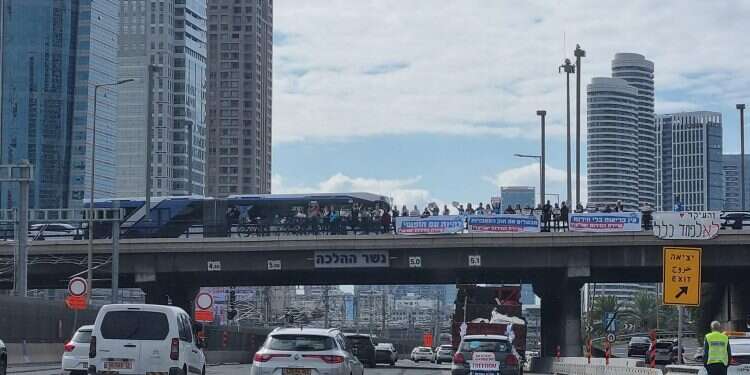Vehicles set off on Monday morning from cities across Israel to participate in a "Freedom Convoy," calling on the government to lift the state of emergency declared due to the pandemic, according to the event's organizers.
Follow Israel Hayom on Facebook, Twitter, and Instagram
The convoy, which includes trucks, tractors, cars and motorcycles, plans to travel to the Knesset in Jerusalem and dozens of bridges throughout the day. It is organized around a central message: "Take back the wheel" – meaning undoing the state of emergency and repealing the so-called "major corona law" granting the government special powers to deal with the spread of the virus, organizers said in a statement.
The project, inspired by the Canadian Freedom Convoy, was organized by laypeople and funded via a crowdfunding campaign.
The convoy has five additional goals beyond repealing the major corona law, according to the release: returning children to their normal routines, including an end to the mask mandate; a complete opening of the economy, including getting rid of testing and other COVID safety requirements; full disclosure of contracts and protocols that have been withheld from public review and consumption, such as the full contract between the Israeli Health Ministry and pharmaceutical giant Pfizer; ending the violation of individual privacy through street cameras or other illegal surveillance; and respecting individual human rights unconditionally by the government regardless of vaccination status.
"The recent morbidity wave has exposed government shortcomings and poor management of the crisis, which in turn has created a crisis of confidence," according to the organizers. "Many government forecasts have failed to prove true; many promises haven't been kept and citizens are realizing that their elected members in the Knesset are detached, improvising with illogical regulations, driven by personal interests and not by the wellbeing of the public. The role of the government is not to rule but to serve its citizens."
As of Monday morning, meanwhile, the Health Ministry's website's latest figures on the spread of the virus showed 18,023 new cases as of Sunday morning and a total of 284,805 active cases in the country. Of those cases, 1,056 were listed as being in serious condition, with 349 of those patients in critical condition and 285 on ventilators. Since the start of the outbreak, a total of 9,544 people are reported by the ministry to have died due to the virus or virus-related complications.
The number of Israelis who were tested on Sunday stood at 68,993 with 26.12% returning a positive result. As of Monday morning, 46,006 Israelis were in quarantine.
At Ben Gurion Airport, meanwhile, a quick PCR test for returnees from abroad will soon be available, Channel 12 News reported on Sunday.
The test is just as reliable as other PCR tests and, for a fee, will allow people to shorten their quarantine time after returning from abroad.
The test in question is one being promoted by the Ministry of Health, and its results can be obtained in three to four hours, instead of 24 hours as is the case with the tests currently being used.
However, it will cost twice as much as the current test – NIS 160 ($55) instead of NIS 80 ($24.5).
The test is part of the new tender for the operation of the test complex at Ben Gurion Airport, and the company that wins the tender will be obliged to offer returnees from abroad both the standard PCR test as well as the rapid test.
Meanwhile, Sheba Medical Center in Tel Hashomer will participate in a global trial by Pfizer, testing a vaccine targeting the Omicron variant.
The first shots will reportedly be given at the end of the month.
Subscribe to Israel Hayom's daily newsletter and never miss our top stories!
Sheba Medical Center began recruiting volunteers, looking for over 60-year-olds who have not had a fourth shot of the existing Pfizer vaccine.
Additionally, volunteers must have been serologically monitored since the beginning of the vaccination campaign.
Due to these conditions, most who will participate will be hospital staff and their family members, the report stated.
The hospital is awaiting the finalization of the agreement and approval from the Health Ministry's Helsinki Committee, which works to authorize medical research and trials on humans.
The fourth shot is currently available to over 60s. Last month, a Health Ministry advisory panel suggested making the second booster available to over 18-year-olds.




